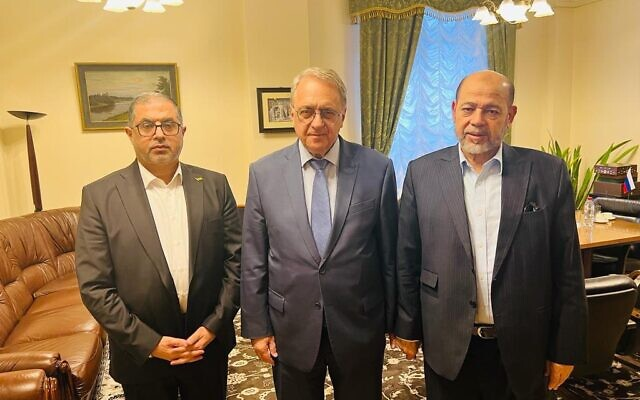The Israeli bombardments in Gaza, following the recent Hamas attack in the south on October 7, has resulted in the deaths of 50 captives who were abducted during the assault by Hamas, according to a member of the Hamas delegation visiting Russia, Abu Hamid. In an interview with the Russian newspaper Kommersant on Thursday evening, Abu Hamid shed light on the grim aftermath of the conflict.
Abu Hamid emphasized that Hamas cannot work to secure the release of additional hostages until a ceasefire agreement is reached. He explained that the terrorist organization requires time to locate all the Israelis who were "taken to Gaza" by other Palestinian factions. This revelation suggests that not only Hamas but also ordinary Gazans and non-Hamas armed militants were involved in the kidnapping, underscoring the complex dynamics of the situation.
What a photo. In the heart of Times Square are 224 empty chairs for 224 hostages being held by Hamas terrorists. #BringThemHomeNow pic.twitter.com/Gm4I0c0oGj
— Aviva Klompas (@AvivaKlompas) October 27, 2023
This statement by Abu Hamid comes in the wake of criticism from the Israeli Foreign Ministry directed at Russia for hosting the Hamas delegation. Israel has accused Russia of providing support to terrorism due to this engagement. This diplomatic tension has escalated following the brutal attack carried out by Hamas terrorists in the southern region of the country.
Interestingly, it appears that Russian President Vladimir Putin has refrained from expressing overt support for Israel during this period and has even criticized the country over alleged responsibility for the bombing of a hospital in Gaza. Furthermore, Russia recently vetoed a proposal in the UN Security Council submitted by the United States, which aimed to condemn Hamas and support Israel's right to self-defense. These developments underscore the complexity of international relations in the Middle East and the diverse range of perspectives on the Israeli-Palestinian conflict.
Iran's Foreign Minister, Hossein Amir-Abdollahian, has also entered the fray by offering a potential solution. He stated at the UN Assembly that Hamas is prepared to release the kidnapped Israeli citizens, but with a significant condition – they seek the release of thousands of Palestinian prisoners in exchange. "We are ready to play our role together with Qatar and Turkey. Naturally, this will come together with the release of the 6,000 Palestinian prisoners in Israel," he asserted. However, he simultaneously issued a stern warning to the United States, cautioning that if what Iran perceives as "genocide" in Gaza continues, it could have severe consequences.
Meanwhile, negotiations for the release of an additional 50 abductees held captive by Hamas have hit an impasse. The sticking point revolves around Hamas's demand that Israel allows the transfer of fuel to the Gaza Strip. According to a report by The Wall Street Journal, this critical detail is currently hindering progress in securing the release of the remaining hostages.
If you watch one thing today it should be this.
— Shelley Greenspan (@ShelleyGspan) October 26, 2023
“What’s harsh is the way Hamas is using people as human shields. What’s harsh is taking a couple of hundred hostages + leaving families and anxious, waiting and worrying to figure out where their loved ones are,” NSC’s John Kirby. pic.twitter.com/kwOz9n618L
In the midst of these negotiations and the ongoing conflict, the attitude of Hamas leader Yahya Sinwar remains a subject of interest. While Sinwar may still be optimistic that Israel will not launch an occupation of the northern Gaza Strip while the hostages remain in his custody, voices from within the Hamas leadership in Qatar and Lebanon paint a slightly less optimistic picture. It is conceivable that they are exerting pressure on the Gazan leadership to adopt a more flexible stance in dealing with the issue of the abductees.


